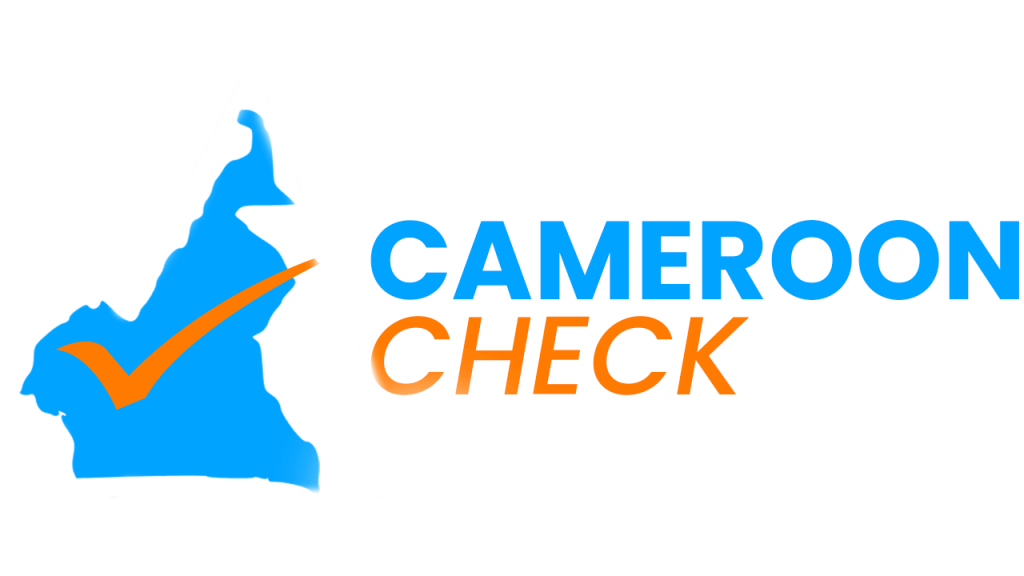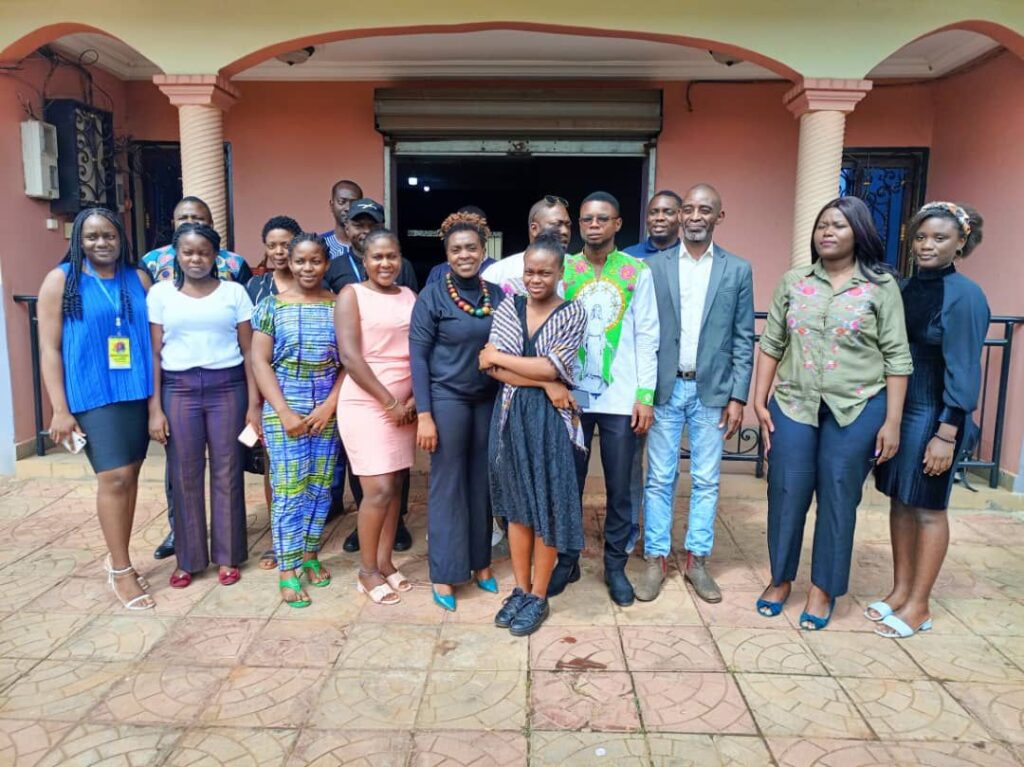MeetUp session by #defyhatenow and AFF Cameroon
This project report summarizes the MeetUp that was held on Wednesday, July 26, 2023, by group 2 of 3, of the 8th cohort of #defyhatenow. It is a program that aims to combat online hate speech and disinformation in Cameroon. The MeetUp was organized in collaboration with Africa Fack Checking Fellowship Cameroon. It took place at the conference room of The Guardian Post daily newspaper in Yaoundé, Cameroon, from 12pm to 2pm. The theme of the MeetUp was: “The role of clickbait and sensationalism in creating disinformation and its impact on society“. This theme was divided into four sub-themes, which were presented by three members of the group and their mentor. The presenters were:
- Ngufack Ntemgwa, a fact checker with CameroonCheck
- Christelle Djembissi, a host at CAM10 TV
- Elvis Serge Nsaa, a journalist at Echos Santé
Fotso Fonkam, the mentor of the group and a senior journalist was present for the meetup. The program coordinator of #defyhatenow, Donald Tchiengue, was also present at the MeetUp. They were a source of moral support and guidance. The program of the MeetUp is shared below.
Reason for Topic Selection
Clickbait and sensationalism often attract attention and generate traffic in the age of social media and online news. However, these practices can also create disinformation and misinformation, which can have negative consequences for society. People spread disinformation deliberately to deceive or influence others with false or misleading information. Both can undermine trust in institutions, erode social cohesion, and polarize public opinion. Therefore, it is important to have a meetup with the theme The role of clickbait and sensationalism in creating disinformation and its impact on society. This meetup will provide an opportunity to discuss the causes and effects of clickbait and sensationalism, as well as the possible solutions and strategies to combat them. It will also help to raise awareness and critical thinking skills among the participants, who can then share their insights and experiences with others.
Presentation Specifics
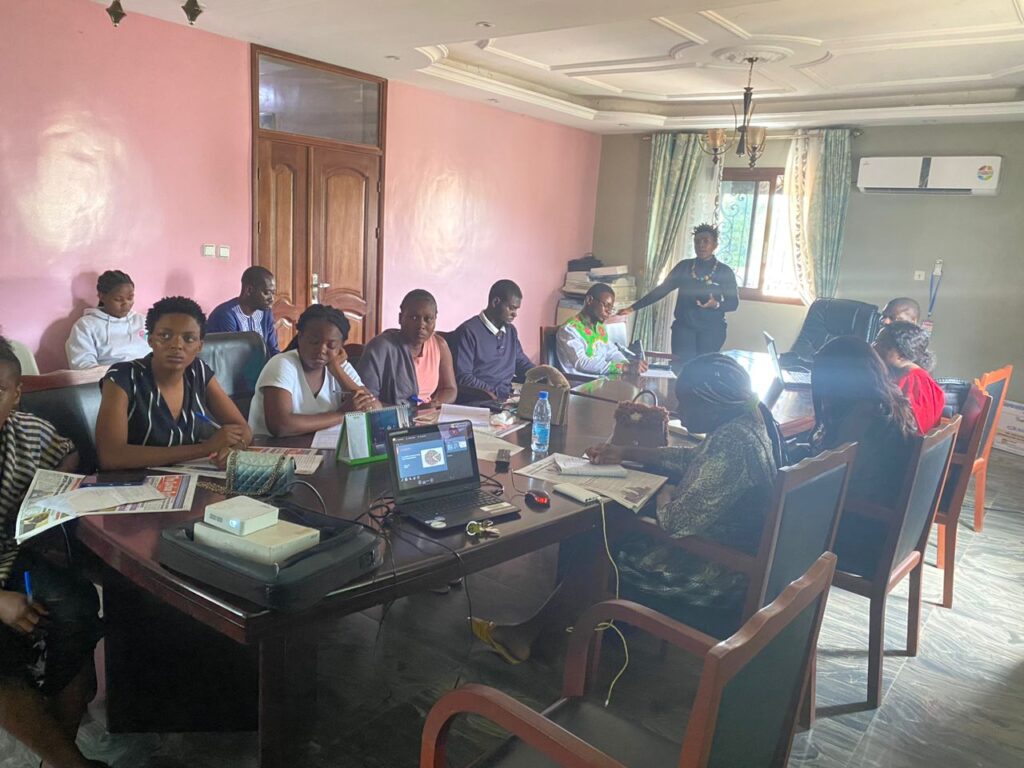
Christelle Djembissi
Christelle Djembissi presented the first sub-theme, “Definition of the key concepts (clickbait, misinformation, sensationalisation)”. She cited the authors who have worked on these concepts and used examples from everyday life to illustrate them. For example, she explained that disinformation is a deliberate and intentional lie, spread by malicious actors who know it is false. Misinformation is false information, spread by people who think it is true. Malinformation is information based on reality but used to harm a person, organization or country.
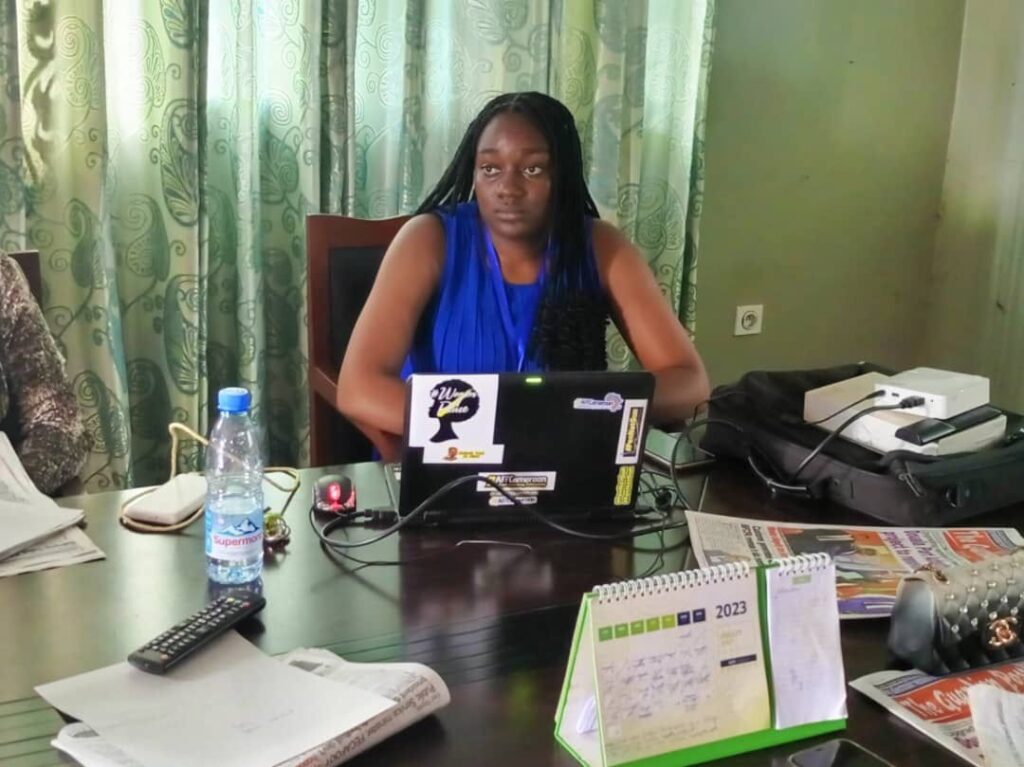
Ngufack Ntemgwa
The next presenter was Ngufack Ntemgwa, who spoke about “How to identify and avoid clickbait headlines”. She showed nearly thirty journalists and communicators how to recognize sensational news and clickbait, understand their causes and effects, and how they undermine the credibility and reliability of media and organizations. She also shared ideas and strategies on how to promote social responsibility and ethical journalism in our work. “Critical thinking is the ability to analyze and evaluate information, arguments and evidence logically and systematically. It involves applying reasoning skills, standards of clarity, accuracy, relevance and coherence to diverse sources of knowledge and assertions. It is a way to enhance media literacy and critical thinking,” she explained. She added that clickbait authors use hyperbolic words to attract their subscribers’ attention and elicit emotional reactions. Words like WOW, LOL, LMAO, AMA, AF, etc. are some of the words commonly use in clickbait titles. However, this practice lowers journalistic standards and erodes reader trust, as clickbait often favours sensationalism over accuracy, impartiality and balance. It can also distort the public’s perception of important issues and events, as clickbait often simplifies or exaggerates complex or nuanced subjects.
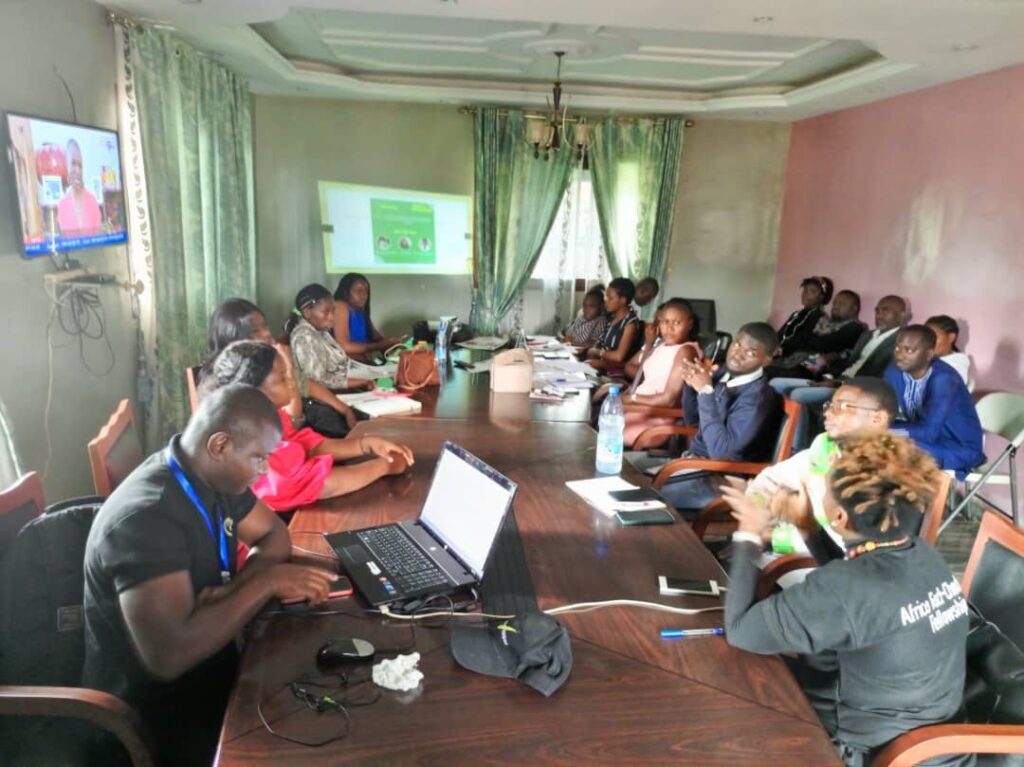
Elvis Serge Nsaa
The third presenter was Elvis Serge Nsaa, who discussed “How to balance fact and opinion in news reporting”. He taught the participants how to tell facts from opinions in news articles. He also taught them how to present both sides of an issue fairly and balancedly. The presenter stressed the importance of giving evidence and context for any claim or argument. He also stressed the importance of recognizing bias or limitations in reporting. Key concepts and explained why misinformation spreads. He said that some people pursue easy gain, views and subscribers. This causes confusion, cynicism and a loss of trust in media, politics and society. He said that this leads to disengagement and apathy. He also said that misinformation harms public morale and threatens democracy. His recommendation is to promote social responsibility and ethical journalism. He said that this means putting the public’s right to information, free expression and criticism first. Paul Ricœur (1994), said that responsibility is a fragile and precious thing. He also mentioned the SNJ’s declaration, which says that the responsibility to inform is the most important one.
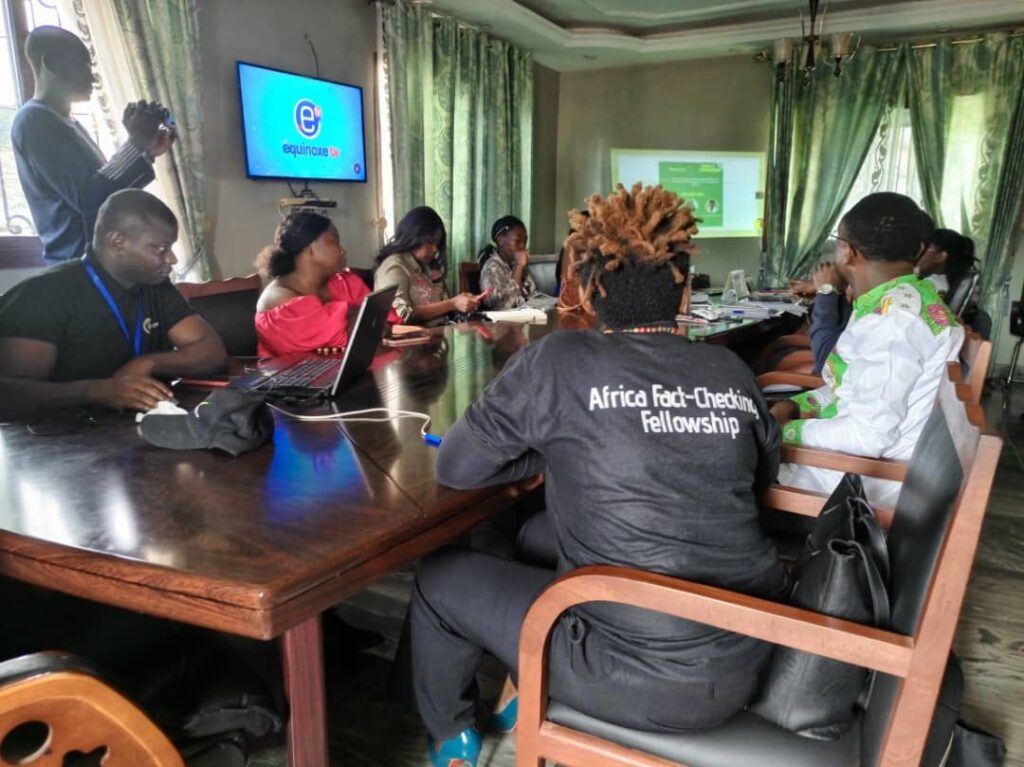
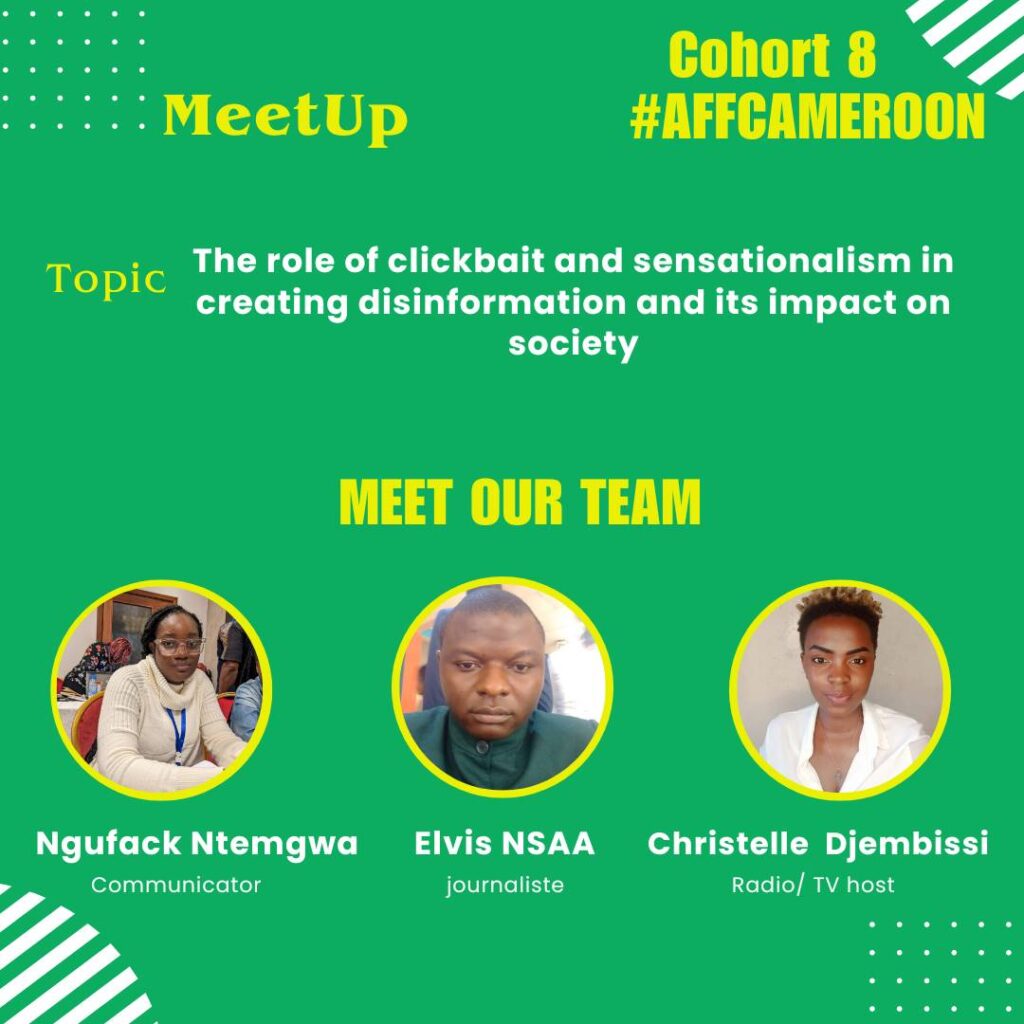
Finally, Ngufack Ntemgwa presented his second theme: “How to promote media education and critical thinking among the public?” He defined media literacy as the ability to access, analyze, evaluate and create media in various forms. He said that media literacy helps us to critically examine the messages we receive and produce, and to make informed decisions about the media we consume and create. He also said that it involves applying reasoning skills, standards of clarity, accuracy, relevance and coherence to diverse sources of knowledge and assertions.
Question & Answer Session
The participants asked questions to the MEETUP presenters to clarify any issues that remained unclear after the session. The presenters answered the questions thoroughly. Junior Ayissi, a journalist with LTM television and coordinator of Media Action Cameroun, praised the initiative. He also presented his project, which involves tracing the career of a professional in the field, so that the newcomers can learn from it. Before taking the family photo, snacks were served. The main takeaway from this session was the importance of assessing the credibility of facts before publishing information. The role of clickbait and sensationalism in creating disinformation and its impact on society is a call for concern to journalists and the population.
Media that reported about the MeetUp
Previous Fact Checks
The Article “Welcome to Yaounde” by TGP Newspaper is Misleading
Corpse Discovery of a Man in his 40s in Bamenda Under Suspicious Circumstances is True
